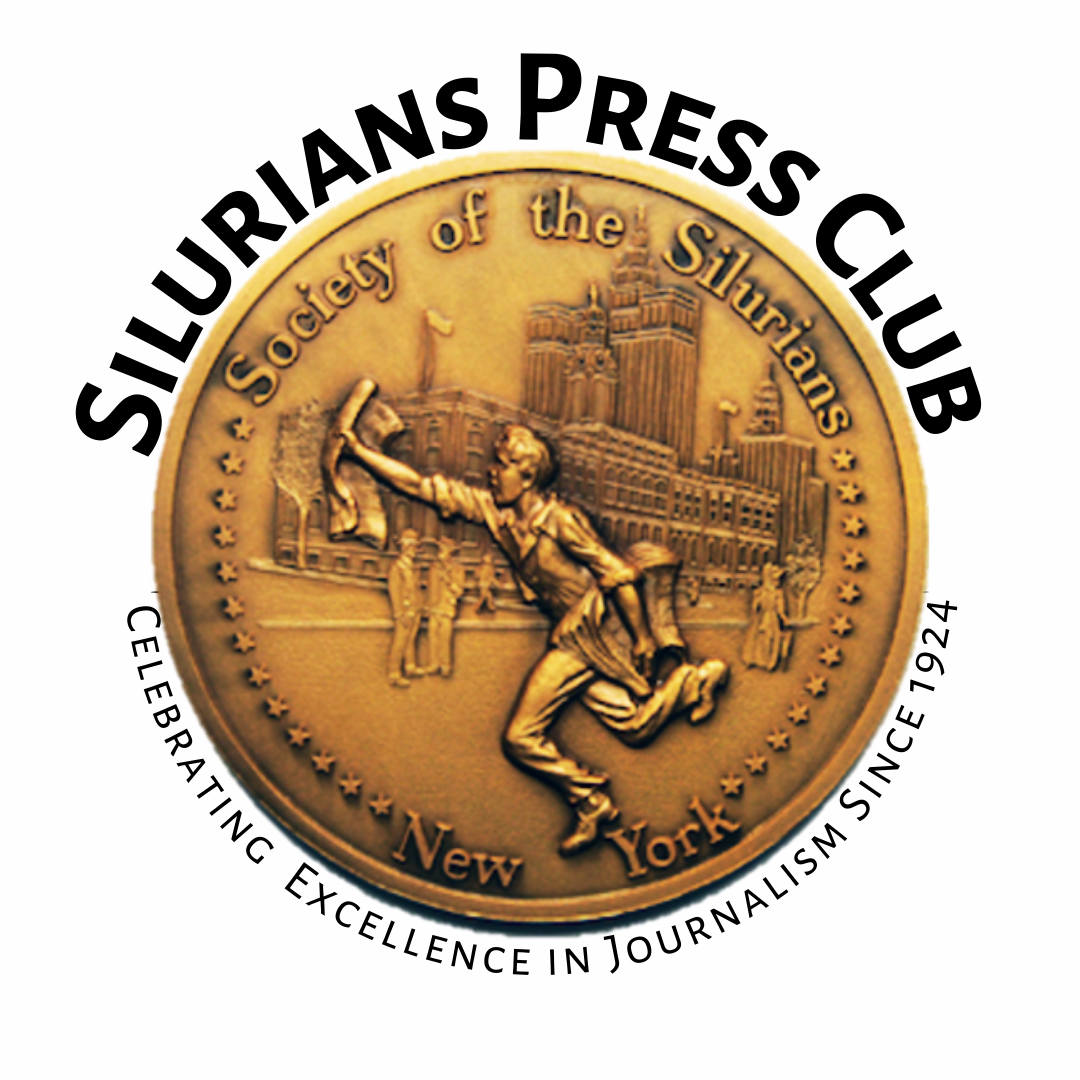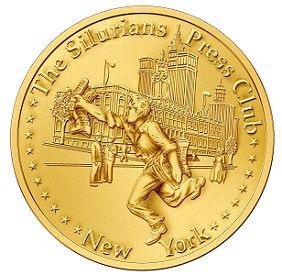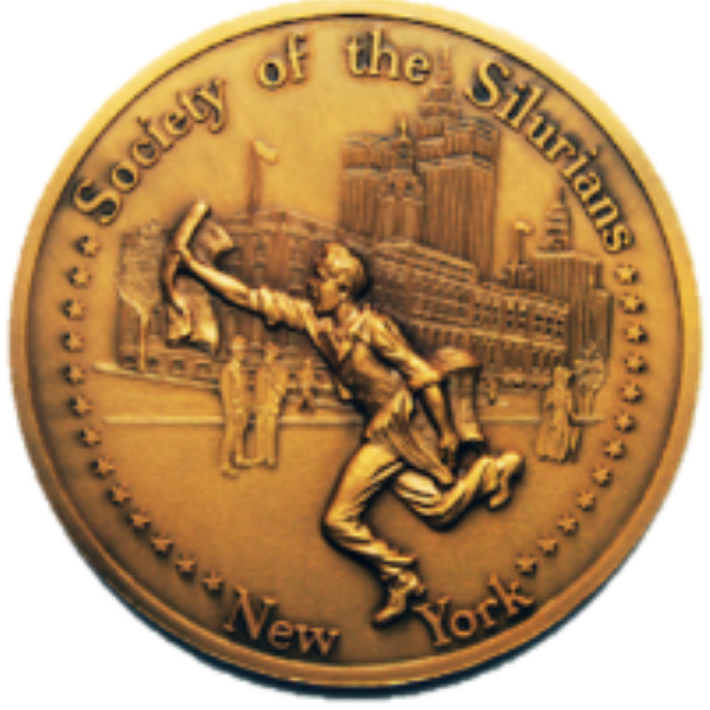
Maggie Haberman
Maggie Haberman: Confidence Man, How Trump Broke America
By David A. Andelman
“For this crowd, you are our Taylor Swift, our number one rock star,” Silurians president Joe Berger proclaimed at the November 16 lunch featuring Maggie Haberman, chronicler of Donald Trump and all his peccadillos.
From the get-go at this memorable luncheon, with the largest in-person turnout since the onset of covid, Maggie was clear: “I try to stick to what I know.” And for 58 riveting minutes under the probing questions of former Silurians president Allan Dodds Frank, she unveiled some of her deepest secrets about a Donald Trump she has come to know more deeply than perhaps any other journalist today.
“He refers to us all as the enemy of the people,” Maggie observed. “One of my fondest memories of covering that White House was sitting in the Oval Office with my colleague Peter Baker and our publisher A.G. Sulzberger sitting across the Resolute desk from Trump, saying directly to Trump, ‘Your language about enemy of the people is enabling despots around the globe to engage in free press crackdowns.’ And Trump just kept responding saying, ‘I think I’m entitled to a good story from my paper.’ [That’s] how he views The Times, which is what his thing with me is about. He is uniquely obsessed with the paper, and I’m just the person who covers him more often than others.”
Which helps explain why Trump was so deeply unhappy about at least some of her reporting especially in her remarkable book, Confidence Man: The Making of Donald Trump and the Breaking of America. “He’s been extremely angry at various aspects of the book including beginning with reporting from February 2022 that he had been flushing documents down the toilet in the White House,” which helps to explain, Maggie, says, why “I haven’t talked to Donald Trump since I interviewed him in September 2021.
And this despite the fact that she’s had access to his succession of cell phone numbers: “He has a different cell phone number now than he used to, because it changed in the White House. And there’s been lots written about his issues with cell phone use that his staff had to spend a lot of time tamping down. It’s just that it always seemed like it was a joke because so much of it ends up seeming, like it’s a running laugh track with him, but it’s not funny. Someone gave me his cell phone number, I’m not going to say who, and then someone gave me his new cell phone number.”
And then there are Donald Trump’s friends—if you could ever say he’s actually had any. As Maggie put it when the topic of Rudy Giuliani came up—a subject very close to many Silurians who’ve covered one or the other or both in the course of their careers. “They have a very transactional relationship, they were not friends,” she began. “This whole line that they were pals going back to New York, and Giuliani was a prosecutor and Trump was in a habit of trying to cultivate prosecutors for obvious reasons.” Then there was the money. “In 1988, Giuliani’s office got a tip about potential money laundering at Trump Tower. They looked into it, dropped it fairly quickly. There’s been claims that there might have been other reasons, which is that Giuliani wanted to have Trump as a fundraiser when Giuliani was about to be mayor. And this basically set the tone, I think, for this relationship.”
Inevitably, of course, there is the question of what the world, even journalists, all too often simply miss about Trump in their dealings with or writing about him. “He has only a handful of moves,” Maggie said thoughtfully. “Everything is flat and the same and devoid of context—describing Meade Esposito as ruling with an iron fist, the same language that he uses to describe Xi Jinping. Everything is the same, and the context doesn’t matter. Donald Trump is the same in every single context. A letter from a notorious dictator written to a sitting president is the same as trading with Page Six to get them not to write a story about his making Marla Maples return two gold Lexuses—and instead giving them the fact that he was divorcing her, which is also in the book if you want to read about it. That’s the part that really gets missed about him.”
But perhaps the single most important observation, that she tossed off almost as an aside, was a simple answer to what could be a most complex question: on what is Donald Trump most perceptive? “What he’s very perceptive about,” Maggie answered quickly, “is the darkness in human behavior.”
The next question allowed her to elaborate. “Do you think Donald Trump understood the just-below-the-surface racism of many Americans?”
“Yes, I do.”
“Better than other people?”
“I think he was more willing to capitalize on it than other people.” It won’t end. “He has normalized so much behavior that had been relegated to the fringes of our politics,” she continued. “Over the course of decades, after the Civil Rights era, and after the 1970s and 80s, he is just sort of frozen in time in 1980s New York City. I write in the book that the only two politicians I ever heard publicly use the phrase ‘The Blacks’ were Donald Trump and Andrew Cuomo. He has a certain mindset. He is openly race-baiting Mitch McConnell’s wife, who was born in Taiwan. He described Governor Glenn Youngkin’s name as sounding Chinese on his social media website the other day. This is not going to a good place and to that end, just to close that thought, his chief policy advisor, Stephen Miller, has been just making increasingly overtly racist, appeals on Twitter. We got one of his mailers at our house in Brooklyn which was pretty striking, and it was all about anti-white and anti-Asian bias, and there will be more of that.”
But that’s only a part of his appeal to the nation, Maggie believes: “One of the things that was very hard for people around the country, when you would try having a discussion with them about ‘he’s not actually as rich as he says he is,’ well, he’s richer than 99% of the country. Because they can see Trump Tower, because they watch The Apprentice, and they thought it was real. Now he has been president, that’s pretty real. They all want a piece of Trump…that’s generally how he sells himself.”
Then there’s a base reality of the anger out there in America. “Why Trump won the presidency? I think that voters in red states who voted for Donald Trump wanted a quote unquote fighter and they wanted somebody who was voicing a level of anger, that a lot of them had in their lives, and Donald Trump came into political being during an enormous era of mistrust in this country, and he fueled it, he capitalized on it.”
So, what’s more important—fame or money? “He is a child of privilege who always had money and who always believed there was going to be a [safety] net there. What he didn’t have was fame. His father couldn’t give him fame. His father could give him connections, his father could give him loans, his father could co-sign agreements with banks and with landholders, but fame was something totally different.”
As for what’s next? Well, we might even have Maggie around to let us know, though she insists “at the moment I’m planning on doing what the paper asks me to do, which is be part of its politics coverage and that will include Donald Trump. But I will not cover him hour to hour the way that I did for the previous years.”
And indeed, there may be quite a lot to cover for a very long time. “The story of this book is about people writing Donald Trump’s obit, over and over and over, and he just finds a way to come back, and the things that matter to us in this room, you know, many of us anyway, do not necessarily matter to the people who cast the votes. He is still really strong. We will know more in the coming days, we will know how his fundraising going. Are donors fleeing, does he have any major donors left? Can he really get a campaign off the ground? Will he get indicted? We don’t know. But absent that, I would not write him off.”
Either way, we now have an absolutely indispensable guidebook to the land of Trump: Confidence Man: The Making of Donald Trump and the Breaking of America from our own Maggie Haberman.


